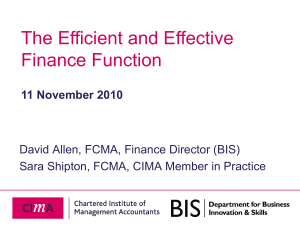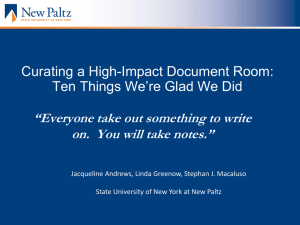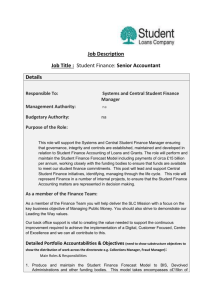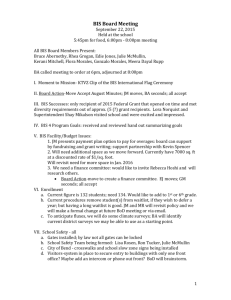11-12 Recommendations - Sinclair Community College
advertisement
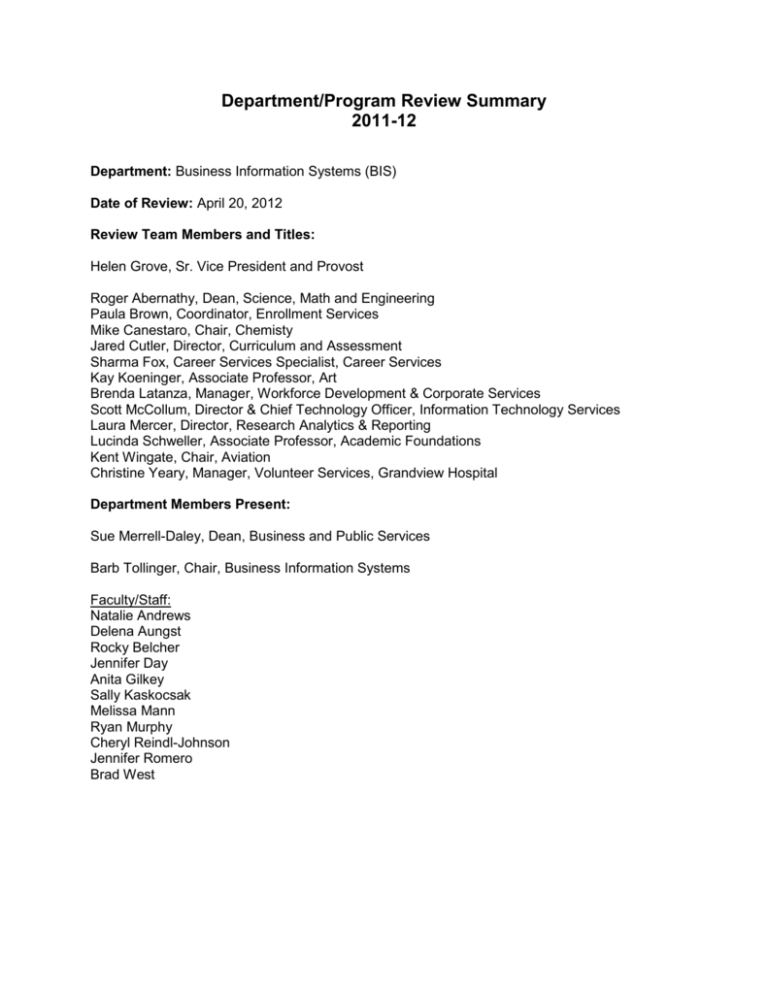
Department/Program Review Summary 2011-12 Department: Business Information Systems (BIS) Date of Review: April 20, 2012 Review Team Members and Titles: Helen Grove, Sr. Vice President and Provost Roger Abernathy, Dean, Science, Math and Engineering Paula Brown, Coordinator, Enrollment Services Mike Canestaro, Chair, Chemisty Jared Cutler, Director, Curriculum and Assessment Sharma Fox, Career Services Specialist, Career Services Kay Koeninger, Associate Professor, Art Brenda Latanza, Manager, Workforce Development & Corporate Services Scott McCollum, Director & Chief Technology Officer, Information Technology Services Laura Mercer, Director, Research Analytics & Reporting Lucinda Schweller, Associate Professor, Academic Foundations Kent Wingate, Chair, Aviation Christine Yeary, Manager, Volunteer Services, Grandview Hospital Department Members Present: Sue Merrell-Daley, Dean, Business and Public Services Barb Tollinger, Chair, Business Information Systems Faculty/Staff: Natalie Andrews Delena Aungst Rocky Belcher Jennifer Day Anita Gilkey Sally Kaskocsak Melissa Mann Ryan Murphy Cheryl Reindl-Johnson Jennifer Romero Brad West Commendations: Throughout the self-study document and the review meeting it was clear that the department functions as a cohesive team, with excellent intradepartmental communication and cooperation. There is abundant evidence of high-level functioning in this unit, and the department is very forwardthinking in its approach. Moreover, the student-centeredness of the department was clearly evident throughout the self-study and review meeting. This department provided an excellent example of how the Program Review self-study should be done – faculty teams were created, weekly meetings were held, and all members of the department were involved. Support staff were also included in some cases. This is a model other departments would do well to follow when preparing self-studies for Program Review. Another strength of this self-study was the judicious use of data to buttress assertions made in the document. Generally when statements were made, they were backed up by appropriate data. The process that the department has established to “hire, mentor, and evaluate part-time faculty” is excellent. It appears that great care is taken to ensure not only the quality of teaching by adjuncts, but also to ensure that instruction by adjuncts is consistent with that in sections taught by full-time instructors in terms of curriculum and course activities. In a similar vein, the department has earned a strong commendation for their use of common assignments and syllabi. Not only does this help encourage greater consistency among sections of a course, but it is also a crucial step in facilitating assessment of student outcomes across the various sections of a course. It appears that the department has achieved a nice balance between standardization and freedom, having common exams and assignments while still giving faculty some latitude in approaching course content. The self-study indicates that the Tartan Tech Desk/SCOPE Desk has resulted in tremendous savings in computer repair expenditures for Sinclair students and staff. The department has taken the measurement of General Education outcomes seriously, and has implemented pre/post surveys to document student improvement on these outcomes. The emphasis the department places on pre-college connections – particularly their relationships with QuickStart and Tech Prep - is to be applauded. The recent increases in BIS internships deserve special mention, along with the general breadth and scope of the department’s internship efforts overall. The department displays evidence of creative problem solving and a student centered approach. For example, starting the BIS 104 course a week late to allow BIS 160 students who feel that they are in over their heads to register for a lower level course is an excellent strategy for increasing student success. Another example is adding the ENG 199 Text Editing course to the curriculum to strengthen students’ writing skills prior to taking Medical Transcription courses. The pre-test/post-test administered in the BIS 160 course is another example in this regard. In response to the number of programs that will no longer be including BIS 160 in their program curricula, the department has demonstrated a considerable amount of flexibility in meeting the computer literacy needs of other departments, developing a course for HIM for example, and thinking of other ways to meet student needs for computer literacy in other programs. The department’s Employer Survey has demonstrated a commitment to tracking students after graduation and making sure they are providing students with the skills their employers will be looking for. The department has demonstrated fiscal responsibility in discontinuing courses and programs where there was low student demand or that duplicated other courses at the institution. Recommendations for Action: The department’s use of common assignments and exams is an important step in taking assessment to the next level. The review team recommends that the department begin capturing the results of these assignments and exams so that analysis can be done to provide evidence of student achievement of course and program outcomes. Ethics currently isn’t a part of the mission statement for this department – it is recommended that a statement regarding development of ethics be incorporated into the department mission statement. The department may want to consider developing a program outcome involving ethics. Also, student learning should also be mentioned more prominently in the mission statement. Currently the mission statement begins with “the mission of the Business Information Systems (BIS) department is to provide quality instruction” – perhaps “quality instruction” should be replaced by “student learning”. The department has done an admirable job of mentoring adjunct faculty, and has done a considerable amount of work ensuring that courses taught by adjuncts are comparable to courses taught by full-time faculty. The level of standardization in this department presents an opportunity to compare sections taught by full-time faculty and sections taught by adjuncts in terms of performance on exams, assignments, and final grades. This could serve as an important tool in identifying possible areas where more work with adjuncts may be needed. The department has adopted a flexible approach to meeting the needs of other departments now that BIS 160 is not required in as many programs in semesters, and the department is strongly encouraged to continue this approach. One suggestion that was made during the review session was the possibility of BIS boot camps – the department is encouraged to explore these kinds of innovative approaches. The department is also encouraged to think about how to approach outreach to other departments to let them know of the opportunities that BIS offers for training their students. Also, the department will want to ensure that the content provided for other departments is offered at the level that students need, and not above what they require for success in their programs. Given typical success rates in BIS 160 in quarters, an examination of areas where students struggled in the past may prove invaluable when these courses are being developed. The department is encouraged to keep an eye on success rates in courses, and with the standardized exams and assignments there is the opportunity to pinpoint areas where students may not be mastering material at the level they could be and for identifying specific areas where improvements could be made. While most departments watch success rate trends, this department is uniquely positioned to more precisely identify where improvement is needed. The measurement of achievement of general education outcomes by surveys is an excellent effort at general education assessment by the department – it is recommended that the department explore ways to supplement this with direct measures of general education outcome attainment. The current survey results provide strong evidence, which would be even stronger if paired with direct evidence of student performance (e.g., scores from assignments that demonstrate written communication skills). The department has put some thought into how to handle teaching BIS content in some of the high capacity rooms that they are currently using – the department is encouraged to continue to pursue ways to improve instruction and learning in these rooms. Overall Assessment of Department’s Progress and Goals: This was an excellent self-study, the overall picture that emerged was of a department that is functioning at a high level as a team, that is proactive, and that is nimble in staying current within the field and in addressing challenges that arise. It was clear that the department took the findings from the last self-study seriously and implemented the review team recommendations. The department’s General Education surveys have demonstrated a commitment to general education assessment, and their employer surveys have demonstrated their commitment to ensuring that their students are getting what they need to be successful once they leave the program. In many areas this is a department that goes above and beyond. There are opportunities for improvement – collection, analysis, and use of data from common exams and assignments is a particularly promising opportunity. The department has been forward thinking in response to BIS 160 being removed from many semester program curricula, and have used it as an opportunity to exercise problem solving skills to meet student computer literacy needs. These efforts should be continued, with a laser-beam focus on meeting student needs. Institutional or Resource Barriers to the Department’s Ability to accomplish its Goals, if any: The goals described in the self-study appear to be well within the department’s reach – the department is encouraged to maintain the sense of teamwork and cohesion that was so evident in the self-study and review team meeting, and to maintain the studentcentered focus it has evidenced in the past.

